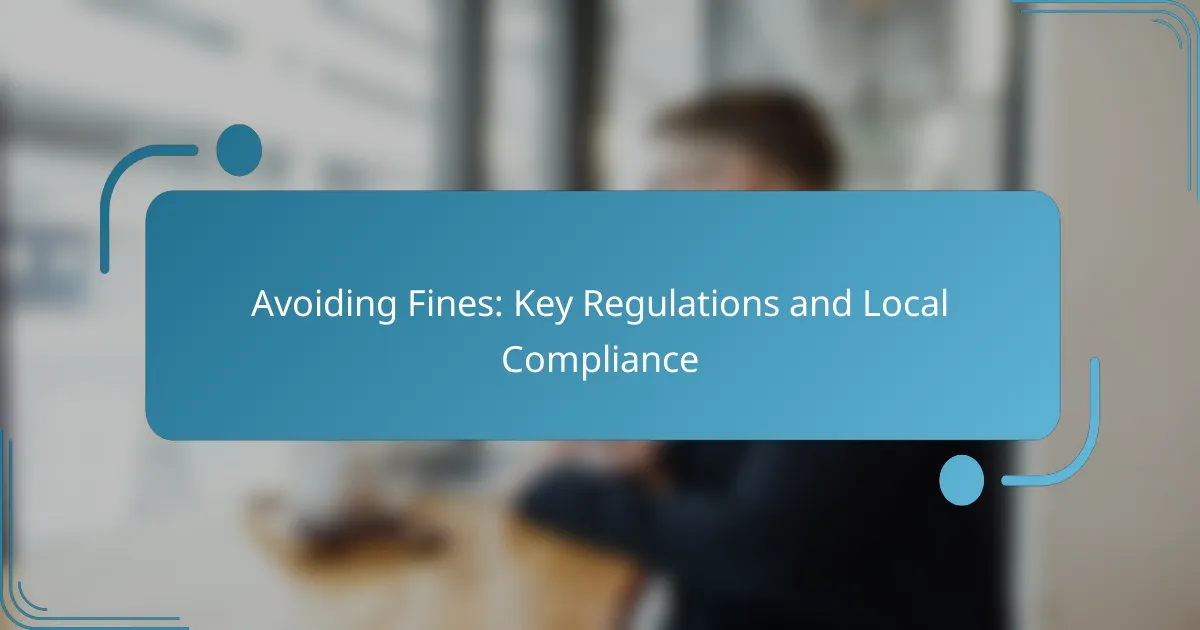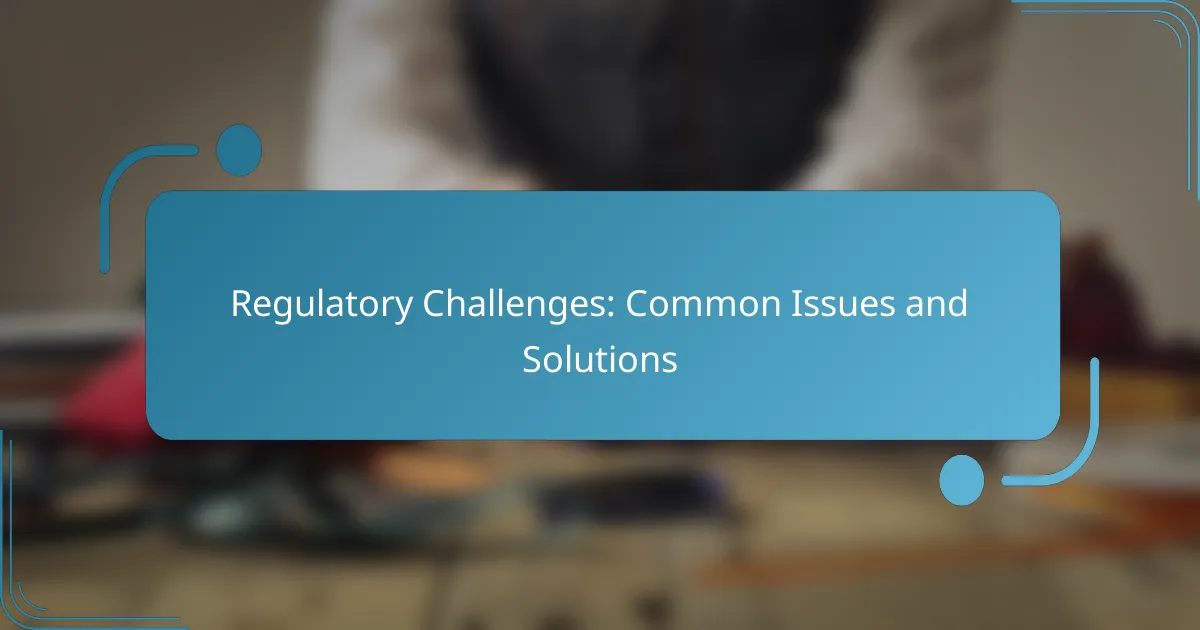Understanding and adhering to key regulations is essential for businesses to avoid fines and maintain operational integrity. Local compliance often involves navigating data protection laws, health regulations, and workplace safety standards. By proactively implementing compliance strategies, such as regular audits and employee training, businesses can mitigate the risks of non-compliance and its severe repercussions.
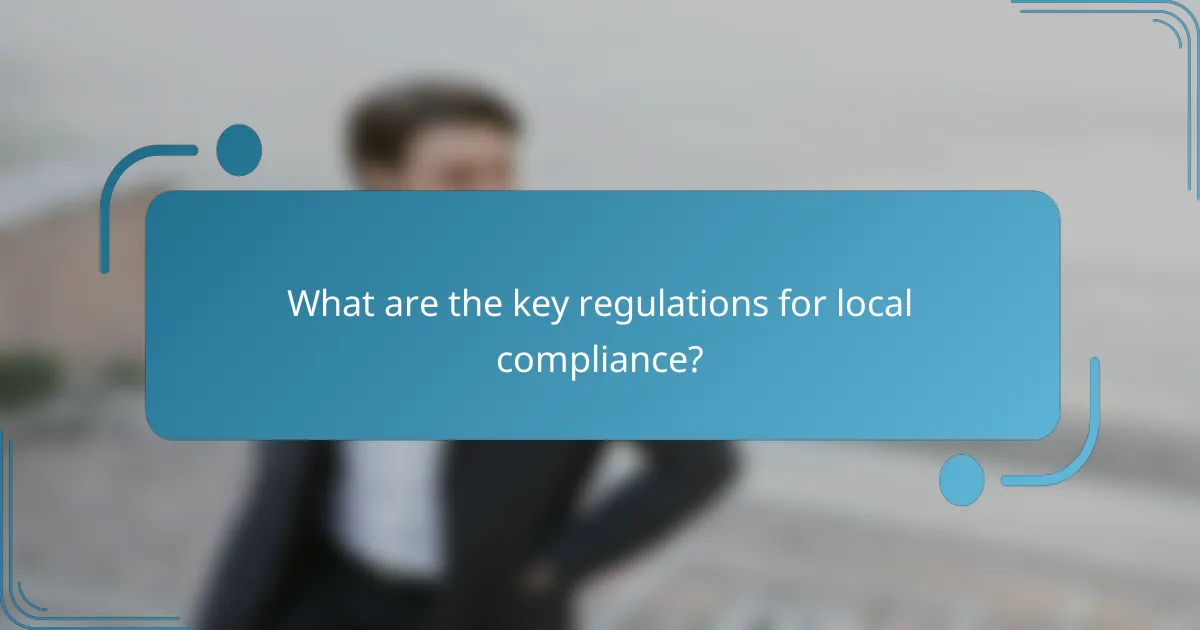
What are the key regulations for local compliance?
Key regulations for local compliance vary by region but often include data protection laws, health regulations, and workplace safety standards. Understanding these regulations is crucial for businesses to avoid fines and ensure operational integrity.
General Data Protection Regulation (GDPR)
The GDPR is a comprehensive data protection law in the European Union that governs how personal data is collected, processed, and stored. Organizations must obtain explicit consent from individuals before processing their data and ensure that data is securely managed.
Non-compliance can result in hefty fines, often amounting to millions of euros, depending on the severity of the violation. Businesses should implement clear data handling policies and conduct regular audits to ensure adherence to GDPR standards.
California Consumer Privacy Act (CCPA)
The CCPA grants California residents specific rights regarding their personal information, including the right to know what data is collected and the right to request deletion. Companies must provide clear disclosures about data practices and allow consumers to opt-out of data selling.
Fines for non-compliance can reach up to $7,500 per violation, emphasizing the importance of transparency and consumer rights. Businesses should regularly review their privacy policies and ensure they are easily accessible to consumers.
Health Insurance Portability and Accountability Act (HIPAA)
HIPAA establishes standards for protecting sensitive patient health information in the United States. Covered entities, such as healthcare providers and insurers, must implement safeguards to ensure the confidentiality and security of health data.
Violations can lead to significant penalties, ranging from thousands to millions of dollars, depending on the level of negligence. Regular training for employees on HIPAA compliance and conducting risk assessments are essential steps for healthcare organizations.
Occupational Safety and Health Administration (OSHA) standards
OSHA standards ensure safe and healthy working conditions in the United States. Employers are required to comply with regulations that cover various aspects of workplace safety, including hazard communication and personal protective equipment.
Failure to comply with OSHA standards can result in fines and increased scrutiny from regulatory bodies. Regular safety training and maintaining proper documentation can help businesses stay compliant and protect their employees.
Environmental Protection Agency (EPA) regulations
The EPA enforces regulations to protect the environment and public health in the United States. Businesses must comply with standards related to air and water quality, waste management, and chemical safety.
Non-compliance can lead to substantial fines and legal action. Companies should conduct environmental audits and implement sustainable practices to minimize their ecological footprint and adhere to EPA guidelines.
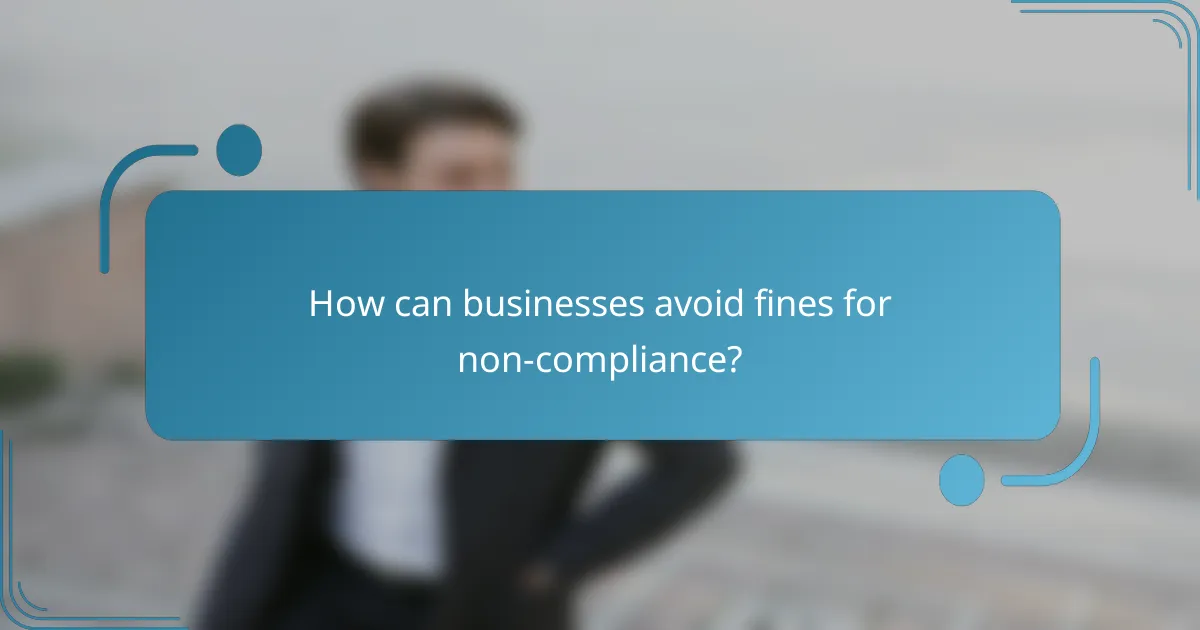
How can businesses avoid fines for non-compliance?
Businesses can avoid fines for non-compliance by proactively implementing strategies that ensure adherence to regulations. Key actions include conducting regular audits, training employees, utilizing compliance software, and seeking legal advice.
Implement regular compliance audits
Regular compliance audits help businesses identify potential violations before they lead to fines. These audits should be scheduled at least annually and can be conducted internally or by external professionals.
During an audit, focus on reviewing policies, procedures, and documentation to ensure they align with current regulations. Consider creating a checklist to streamline the process and ensure all areas are covered.
Provide employee training programs
Employee training programs are essential for fostering a culture of compliance within an organization. Regular training sessions should cover relevant regulations and the specific responsibilities of employees in maintaining compliance.
Utilize various formats for training, such as workshops, online courses, or seminars, to accommodate different learning styles. Ensure that training is updated regularly to reflect any changes in laws or company policies.
Utilize compliance management software
Compliance management software can streamline the process of tracking and managing compliance activities. These tools often include features like document management, reporting, and alerts for regulatory changes.
When selecting software, consider factors such as user-friendliness, integration capabilities with existing systems, and support services. Many businesses find that investing in such software reduces the risk of non-compliance significantly.
Engage legal counsel for guidance
Engaging legal counsel can provide businesses with expert guidance on navigating complex regulations. A legal professional can help interpret laws and ensure that company policies are compliant.
Consider establishing a retainer agreement with legal counsel for ongoing support, especially in industries with rapidly changing regulations. This proactive approach can save businesses from costly fines and legal disputes in the long run.
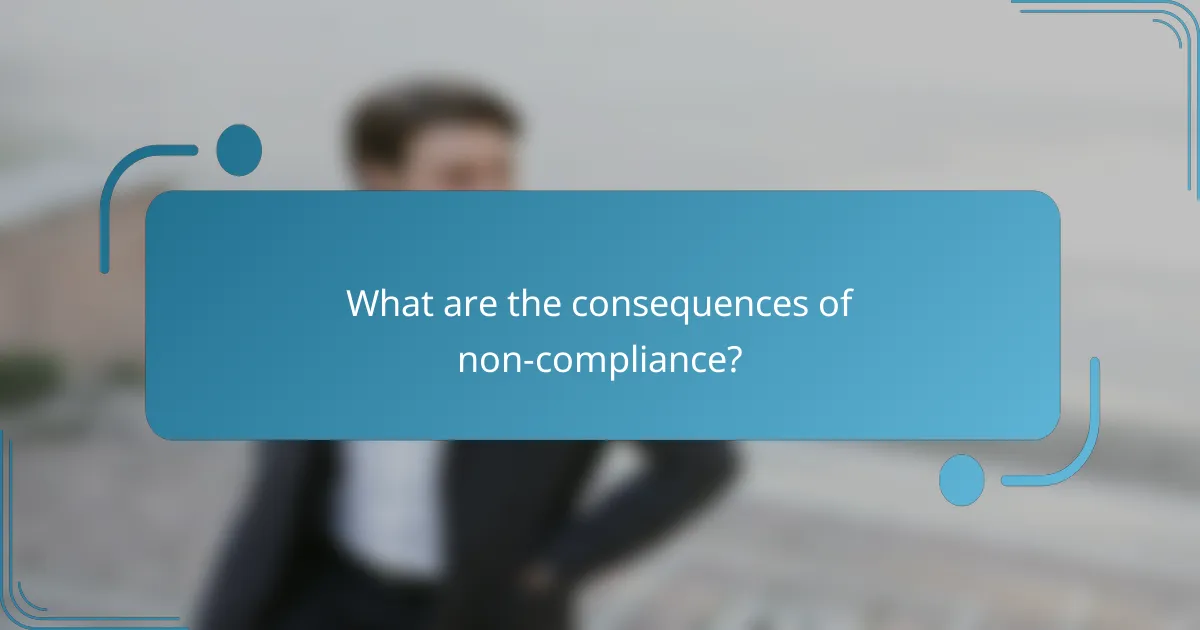
What are the consequences of non-compliance?
Non-compliance can lead to severe repercussions for businesses, including financial penalties, legal actions, reputational harm, and operational disruptions. Understanding these consequences is crucial for maintaining compliance and avoiding costly setbacks.
Financial penalties
Financial penalties are among the most immediate consequences of non-compliance. Regulatory bodies may impose fines that can range from hundreds to millions of dollars, depending on the severity of the violation and the specific regulations involved.
For example, businesses in the European Union may face fines up to 4% of their annual global turnover for data protection violations under the General Data Protection Regulation (GDPR). It’s essential to stay informed about applicable regulations to avoid these costly penalties.
Legal action
Non-compliance can trigger legal actions from regulatory authorities or affected parties. This may include lawsuits, injunctions, or other legal proceedings aimed at enforcing compliance or seeking damages.
In the United States, companies may face class-action lawsuits if their non-compliance results in consumer harm. Engaging legal counsel to navigate compliance requirements can help mitigate these risks.
Reputational damage
Reputational damage is a significant consequence of non-compliance that can affect customer trust and brand loyalty. Negative publicity from compliance failures can lead to a loss of customers and market share.
For instance, a company that fails to comply with environmental regulations may face public backlash, leading to decreased sales and a tarnished brand image. Maintaining transparency and actively managing compliance can help protect a company’s reputation.
Operational disruptions
Operational disruptions often occur as a result of non-compliance, impacting a company’s ability to function smoothly. Regulatory investigations or enforcement actions can halt operations, leading to lost revenue and increased costs.
For example, a manufacturing facility found in violation of safety regulations may be forced to shut down until compliance is achieved. Regular audits and compliance training can help prevent such disruptions and ensure ongoing operations.
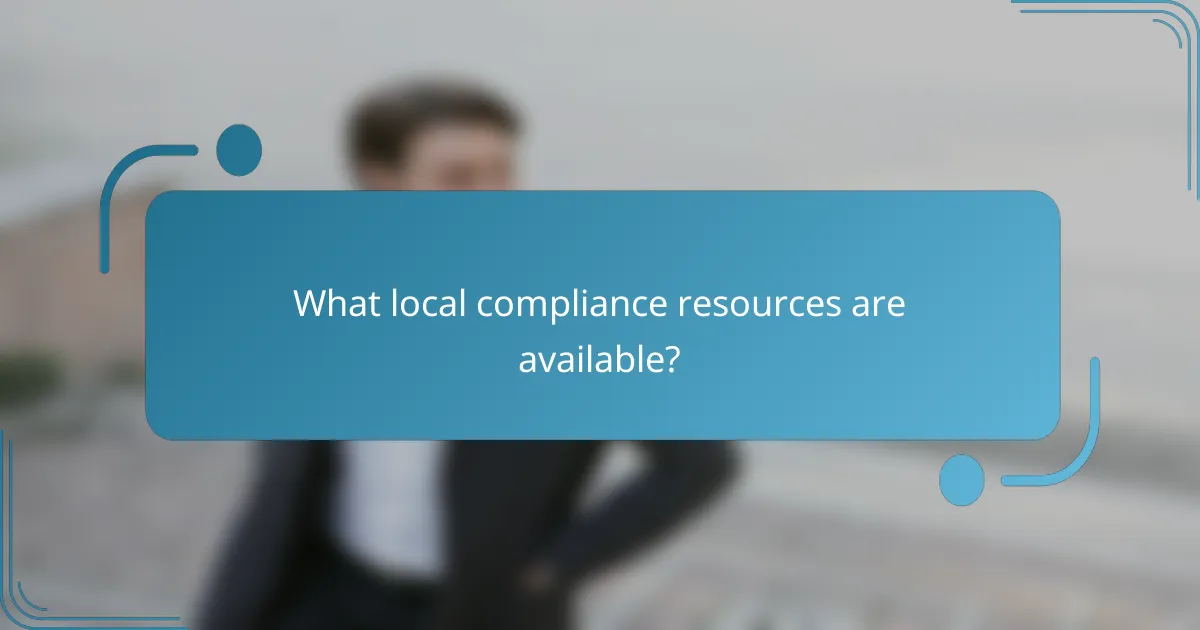
What local compliance resources are available?
Local compliance resources are essential for businesses to navigate regulations and avoid fines. These resources provide guidance on legal requirements, industry standards, and best practices tailored to specific regions.
Local chambers of commerce
Local chambers of commerce serve as valuable hubs for businesses seeking compliance information. They often provide resources such as workshops, seminars, and networking opportunities that focus on local regulations.
Membership in a chamber can also offer access to legal advice and compliance checklists tailored to the local business environment. Engaging with your chamber can help you stay informed about changes in legislation that may affect your operations.
State regulatory agencies
State regulatory agencies are crucial for understanding compliance requirements specific to your state. These agencies oversee various sectors, including health, safety, and environmental regulations, and often publish guidelines and resources on their websites.
It’s important to regularly check your state agency’s updates, as regulations can change frequently. Many agencies also offer direct assistance through hotlines or in-person consultations to help businesses understand their obligations.
Industry associations
Industry associations provide sector-specific compliance resources that can be invaluable for businesses. These organizations often develop best practices, conduct research, and offer training programs focused on compliance within particular industries.
Joining an industry association can also connect you with peers who face similar compliance challenges, allowing for shared insights and strategies. Many associations provide access to legal experts who can clarify complex regulations.
Compliance consulting firms
Compliance consulting firms specialize in helping businesses understand and meet regulatory requirements. They offer services such as risk assessments, compliance audits, and tailored training programs to ensure your business adheres to local laws.
When selecting a consulting firm, consider their expertise in your specific industry and their track record with local regulations. Investing in compliance consulting can save you from potential fines and enhance your operational efficiency.

How to choose the right compliance strategy?
Selecting the right compliance strategy involves understanding the specific regulations that apply to your industry and assessing your company’s unique characteristics. A tailored approach ensures that you meet legal requirements while minimizing risks and costs associated with non-compliance.
Assess industry-specific requirements
Each industry has distinct regulations that dictate compliance strategies. For instance, financial services must adhere to strict anti-money laundering laws, while healthcare organizations must comply with patient privacy regulations like HIPAA in the U.S. Understanding these requirements is crucial for developing an effective compliance plan.
To assess industry-specific requirements, start by identifying the key regulations that impact your sector. This may involve reviewing government publications, industry standards, and consulting with legal experts. Regularly updating your knowledge is essential, as regulations can change frequently.
Evaluate company size and structure
Your company’s size and organizational structure significantly influence your compliance strategy. Smaller companies may have more flexibility but fewer resources, while larger organizations often face more complex regulatory obligations and may need dedicated compliance teams.
Consider conducting a compliance risk assessment that factors in your company’s size. For example, a small business might adopt a simplified compliance framework, while a multinational corporation may require a comprehensive compliance program with multiple layers of oversight. Tailoring your strategy to fit your company’s structure can enhance effectiveness and efficiency.






